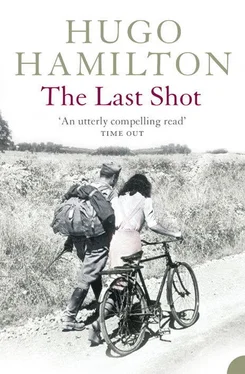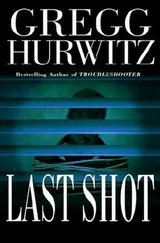At dinner, they all sat around the table while Monica served the lentil stew. All in all there were eleven at the table. Five women, including Monica’s mother and aunt, along with four young children belonging to the other women, Frieda and Caroline. Occasionally, there were great bursts of conversation. At other times, everybody was quiet, all staring at Franz. He was the only man they had seen in weeks. They all spooned the pale stew, young and old, unable to take their eyes off Franz Kern.
At one stage, Monica began to cry again.
‘I still can’t believe it,’ she said, wiping her eyes with her apron again.
Her mother held her arm and said, ‘We’re all very happy for you, my dear.’
They asked Bertha where she came from. And Bertha told them about her home town of Kempen.
‘Do they know you’re coming back?’ Monica’s mother asked.
‘No, not yet,’ Bertha answered. And suddenly, amidst this strange extended family in Nuremberg, she had a fierce longing to be with her own family. She could see their joy when she walked in the door. Bertha stared down at her soup, imagining the faces of her mother and her sisters.
‘How will you get home from here?’ Monica asked.
‘I don’t know really,’ Bertha said. She looked at Franz for support. If ever there was a moment to speak up, this was it. But Franz postponed it again.
The chance was lost.
‘Ach, there will be lots of traffic heading in that direction towards Frankfurt,’ Monica’s mother said. ‘What do you think, Franz?’
He said he wouldn’t know. The chance was lost again.
The children were put to bed. They went to sleep on the floor while the adults sat at the table and talked. Franz had said nothing yet. Perhaps he was leaving it till the next day. Perhaps it seemed too cruel. At times, Bertha thought of bringing up the subject of herself and Franz. But there were too many people in the room.
They all had to sleep on the floor. There was hardly room for them all. As expected, Franz slept by the cooker, beside Monica. Bertha was given a place by the door, where she slept alone under her coat, looking up at the ceiling, at the patches where the plaster had fallen off and all the cracks where the plaster was ready to give. She was exhausted. But she couldn’t sleep. She had a constant feeling that the plaster above her was about to fall.
It was also the feeling that she was indoors. After so many days out in the open, sleeping under the stars, she felt claustrophobic. Her sense of smell had heightened, too, which added to her confined feeling. Most of all, she missed Franz. He was still so close to her, she recognized his breathing among the others.
She stayed awake all night, and slowly began to realize how far away he really was. Some time before dawn she decided it was too cruel to take him away again. She got up and gathered her things quietly and disappeared. The only thing that kept her from crying was the sound of her own footsteps and the thought of her own home in Kempen.
If Franz still wanted to come to America, he would know where to find her.
At 6 o’clock, Bertha Sommer stood on the main road from Nuremberg to Frankfurt. There were many vehicles on the road already at that time of the morning. Most of them were full. Then came a convoy of American trucks and one of them stopped to pick her up.
She sat in the back of the truck with the soldiers. At first she was quiet. She knew she was ready to burst into tears any minute. But then the soldiers began to ask her questions in English and she had to concentrate. She made use of what phrases she knew to explain that she was going as far as Kempen, Niederrhein. She had to cross the Rhine, she told them awkwardly, with the aid of hand movements.
Later, one of the soldiers asked her if she could sing ‘Lili Marlene’. She said yes, but it was far too early in the day. They persisted. Eventually she did sing it for them. They clapped and cheered. Some of them offered her cigarettes. Some of them offered chewing gum. She didn’t take either. Then they asked for another song, and she sang a song which was later made famous by Elvis Presley under the title ‘Wooden Heart’.
Muss i denn, muss i denn, zum Städtele ‘naus,
Städtele ‘naus, und du mein Schatz bleibst hier?
Hugo Hamilton was born in Dublin. He is the author of six novels, a collection of short stories, and the acclaimed memoir The Speckled People, which is also published by Harper Perennial.
Praise
From the reviews of The Last Shot:
‘A remarkable book whose presence remains long after the reading is finished. Quiet though the tone of the novel may be, Hamilton is actually making a large proposition about love and our relationship with history through love… To have managed this without falling into cliché would have been commendable; to have done it so sweetly, so convincingly and so powerfully is an achievement… A fine novel from a very talented writer’
Irish Times
‘Responsiveness characterizes Hugo Hamilton’s novel, even more than the cleverness and anguish of its plotting…Hamilton is a natural storyteller, with poise, daring and control, and he is already quite unmistakable’
Times Literary Supplement
‘Hamilton has the Irish writer’s instinct for beauty. This has married well with his German inheritance on his mother’s side; the tone of his fiction is darkly romantic. His book ends splendidly and unexpectedly, leaving the reader with that all too rare sense of wanting more’
Guardian
The Speckled People
The Sailor in the Wardrobe

Harper Perennial
An imprint of HarperCollins Publishers
77–85 Fulham Palace Road
Hammersmith
London W6 8JB
www.harperperennial.co.uk
This edition published by Harper Perennial 2006
FIRST EDITION
First published by Faber and Faber Limited 1991
Copyright © Hugo Hamilton 1991
Hugo Hamilton asserts the moral right to be identified as the author of this work
A catalogue record for this book is available from the British Library
This novel is entirely a work of fiction. The names, characters and incidents portrayed in it are the work of the author’s imagination. Any resemblance to actual persons, living or dead, events or localities is entirely coincidental.
All rights reserved under International and Pan-American Copyright Conventions. By payment of the required fees, you have been granted the non-exclusive, non-transferable right to access and read the text of this e-book on-screen. No part of this text may be reproduced, transmitted, downloaded, decompiled, reverse engineered, or stored in or introduced into any information storage and retrieval system, in any form or by any means, whether electronic or mechanical, now known or hereinafter invented, without the express written permission of HarperCollins e-books.
This book is sold subject to the condition that it shall not, by way of trade or otherwise, be lent, re-sold, hired out or otherwise circulated without the publisher’s prior consent in any form of binding or cover other than that in which it is published and without a similar condition including this condition being imposed on the subsequent purchaser.
HarperCollins Publishers has made every reasonable effort to ensure that any picture content and written content in this e-book has been included or removed in accordance with the contractual and technological constraints in operation at the time of publication.
Читать дальше
Конец ознакомительного отрывка
Купить книгу













